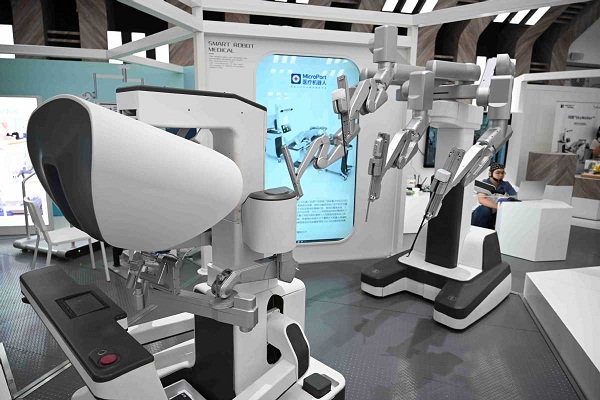Guideline highlights 'innovation' in remolding Pudong

Smart robots are displayed at a demonstration zone in Zhangjiang AI Robot Valley, a high-tech hub in Pudong New Area, Shanghai. [Photo by Shen Chunchen/For China Daily]
Shanghai's Pudong New Area is expected to be elevated into a key technological innovation hub with global influence due to strong policy support from central authorities, officials said.
They expect a newly released guideline to build Pudong into a pioneer for socialist modernization by boosting innovation-driven and high-quality development of the area and help inject new impetus into the growth of Pudong, that of Shanghai and the whole nation.
Citing the new guideline released by the Communist Party of China Central Committee and the State Council, Xu Xin, director of the Pudong Science Technology and Economy Commission, said Pudong is set to lead innovation in core industries and fields, becoming a key driver for sharpening China's key competitive edge in high-tech sectors.
Xu said Pudong will further strengthen the industrial chain and build an advanced manufacturing industrial cluster featuring six major industries, such as chipmaking, AI and big data. More efforts will also be made to boost emerging industries, such as new materials, and develop a group of leading high-tech enterprises.
Zhangjiang Science City, a Silicon Valley-like technology and science hub in Pudong, is set to serve as the core of the AI industry and one of the main forces for Pudong to become a global scientific innovation center, said Nan Yang, an official with the Promotion Office of the Construction of Scientific and Technological Innovation for Shanghai.
The construction of Zhangjiang AI Robot Valley marks a key step for the city. The valley is set to cover 3.9 square kilometers upon completion. By the end of the 14th Five-Year Plan (2021-25) period, Zhangjiang AI Robot Valley is expected to see its robotics industry worth 70 billion yuan ($10.8 billion), nurturing 150 core robotics businesses and 10 listed robotics companies, official data showed.
As of the first quarter of 2022, the ABB robotics factory, with an investment of $150 million, is expected to begin operating in Zhangjiang AI Robot Valley. It will mark an advanced and automated robotics factory as a leading center where robots make robots.
Wang Tao, head of the Zhangjiang AI Robot Valley project, said the valley currently generates an annual output value of 11.7 billion yuan and it aims to build a robotics community covering the whole robotics industry chain.
"With a key focus on the industrial internet and robotics, the valley will mainly develop the robotics industry in fields such as industrial applications, healthcare, rehabilitation and smart services," Wang noted. "In the second half of 2021, we will continue to encourage leading robotics companies to set up open innovation platforms, robotic inspection platforms, robotics think tanks and other functional platforms. And those platforms are set to be completed this year."
Chinese rehabilitation robotics company Fourier Intelligence is one among many leading tech companies that have seen the rising growth potential of the Zhangjiang AI Robot Valley. In July, the company moved into the Zhangjiang AI Robot Valley.
Gu Jie, founder and CEO of Fourier Intelligent Group, said the valley will help create key industrial clusters for the development of robotics in the future.
"Looking ahead, we will continue to increase investment into the research and development of our core technologies, strengthen the cooperation of global labs and institutions, and set up more application centers in the domestic market," Gu added.
Gu took a rosy view of the future development of AI robots, saying the government's plan to boost technological innovation will foster more supportive policies for the industry.
After six years of development, Fourier Intelligence has established branches in cities such as Melbourne, London and Chicago, and its rehabilitation robot products are exported to more than 30 countries and regions.


 China's public holidays for 2025
China's public holidays for 2025  Shanghai FTZ: Go all out to build China's first pilot zone for Silk Road E-commerce cooperation
Shanghai FTZ: Go all out to build China's first pilot zone for Silk Road E-commerce cooperation  Favorable policies boost 'China Travel' trend
Favorable policies boost 'China Travel' trend  play
play 